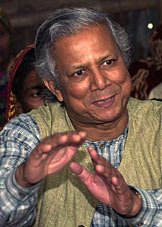Beyond FANFARE: Nobel Laureates Offer Hope for Brighter Future
 The list of the 2006 Nobel Laureates is impressive. Most are Americans who’ve made important contributions in various areas, including medicine. Thanks to the work of Nobel Laureates Andrew Fire and Craig Mello and their 1998 discovery of “gene silencing,” for example, plans are now underway to use “silencing RNA” to treat viral infections, heart disease, cancer, and other medical conditions.
The list of the 2006 Nobel Laureates is impressive. Most are Americans who’ve made important contributions in various areas, including medicine. Thanks to the work of Nobel Laureates Andrew Fire and Craig Mello and their 1998 discovery of “gene silencing,” for example, plans are now underway to use “silencing RNA” to treat viral infections, heart disease, cancer, and other medical conditions.I was most intrigued by two international Nobel Laureates, Turkish novelist Orhan Pamuk and innovative banker to the poor in India, Muhammad Yunus. I’d read about Pamuk and how he’d been criticized in his own country:
“In his home country, Pamuk has a reputation as a social commentator even though he sees himself as principally a fiction writer with no political agenda. He was the first author in the Muslim world to publicly condemn the fatwa against Salman Rushdie. He took a stand for his Turkish colleague Yaşar Kemal when Kemal was put on trial in 1995. Pamuk himself was charged after having mentioned, in a Swiss newspaper, that 30,000 Kurds and one million Armenians were killed in Turkey. The charge aroused widespread international protest. It has subsequently been dropped.” (Nobelprize.org bio)
According to a recent Associated Press article, “Academy head Horace Engdahl said Pamuk’s political situation in Turkey had not affected the decision. He said Pamuk was selected because he had ‘enlarged the roots of the contemporary novel’ through his links to both Western and Eastern culture. ‘This means that he has stolen the novel, one can say, from us Westerners and has transformed it to something different from what we have ever seen before.’” As the Nobel Foundation put it: “In the quest for the melancholic soul of his native city” of Istanbul, Pamuk “has discovered new symbols for the clash and interlacing of cultures.”
While Pamuk draws attention to the challenges facing our world as Western and Eastern cultures continue to collide, Muhammad Yunus offers a simple but empowering way to help the poor in his native India through the Grameen Bank he founded: micro-credit. Through micro-credit, poor people are given small loans and are asked to pay back those loans as they are able.
According to another recent AP article: “Anyone can qualify for a loan—the average is about $200—but recipients are put in groups of five. Once two members of the group have borrowed money, the other three must wait for the funds to be repaid before they get a loan.” According to the Grameen Bank, “the method encourages social responsibility. The results are hard to argue with—the bank says it has a 99 percent repayment rate. Since Yunus gave out his first loans in 1974, micro-credit schemes have spread throughout the developing world and are now considered a key to alleviating poverty and spurring development.”
As the Nobel Foundation put it: “Lasting peace can not be achieved unless large population groups find ways in which to break out of poverty. Micro-credit is one such means. Development from below also serves to advance democracy and human rights” especially among poor women.
On the wall of our study is a rendering of a human figure by my good friend, teacher and artist (and illustrator of my book’s cover) Michele Holcombe Pisetzner. The figure is composed of words from Dr. Martin Luther King, Jr.’s Nobel Lecture in December 1964: “There is nothing new about poverty. What is new, however, is that we have the resources to get rid of it…. Today, therefore, the question on the agenda must read, why should there be hunger and privation in any land, in any city, at any table…?”
Thanks to the efforts of pioneers like Muhammad Yunus, the poor of India and many other countries now have a fighting chance as they struggle to establish small businesses and feed and clothe their families. Meanwhile, thanks to the outspoken bravery of people like writer Orhan Pamuk, governments are being forced to acknowledge mass killings that never should have happened. The deaths of innocents mar the histories of so many countries, including our own. Only through reconciliation and positive change can we hope to achieve a more prosperous and peaceful future. Thanks to all Nobel Laureates, past and present, for helping us find our way.
Photo of Muhammad Yunus © P. Rahman/Scanpix








3 Comments:
What an amazing man! I'm grateful for the opportunity to learn more about him.
Thanks, Patry! There's so much good happening in the world alongside the tragedies we hear about every day.
Peace is easy to foster!
What is needed is a real, good wish and a strong will! You do not need a PhD, or a superpower to flaunt peace promises. You need genuine will through simple golden rules, and a "call for Peace".
When basic needs will be met, when mutual respect will be restored, peace will follow. Even the Nobel Committee believes and recognises same philosophy.
Oh, yes! The Peace Prize recepient is Bangladeshi, NOT Indian.
Thanks for allowing me to express.
Syed Imtiaz Ali.
Dhaka, Bangladesh.
Post a Comment
<< Home